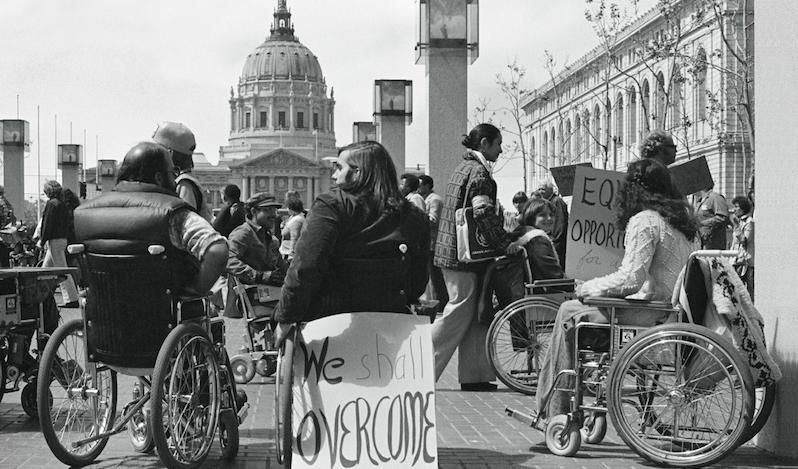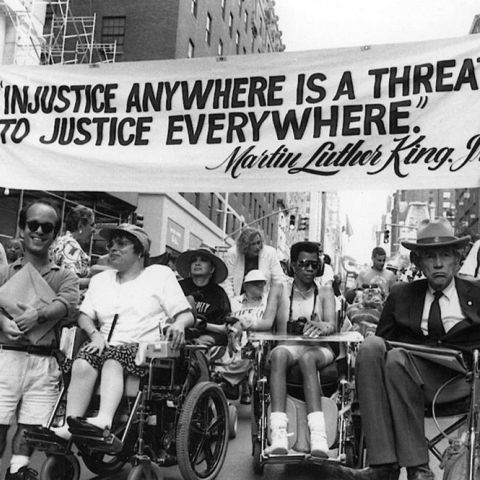Linguistic Ableism And Neurodivergency In India
- Aftar Ahmed

- Sep 23, 2021
- 7 min read
Guest Writer

Image Credits: NationofChange
Language, as a principal method of communication, is what has distinguished Homo-Sapiens all these years. It has given us unrivalled dominance over other species and massive creatures that once walked this earth. As the British Biologist Charles Darwin once put it “ the lower animals differ from man solely in his almost infinitely larger power of associating together the most diversified sounds and ideas.” Historically, Language has helped us build communities, think proactively, and establish relations of trust, something which the other species fundamentally lacked.
Over the centuries, numerous languages have originated and flourished in all corners of the world. India, with its 22 official languages and numerous dialects is no stranger to the idea of cultural fusion and diversified communication channels. India’s multicultural identity and linguistic diversity are beautifully captured in a popular aphorism Kos-kos par badle paani, chaar kos par baani (The language spoken in India changes every few kilometres, just like the taste of the water). We are a language-specific nation and our language of thought and communication is very important in establishing relations with the masses on the ground. We have our communication and thinking patterns in all languages for our everyday necessities and functions. However, when one looks at the dynamics between language and Mental Health in India, we find a sheer misuse and perpetuation of harmful language to communicate about disabilities and mental health issues. This further controls the imagination of the masses at large and passes on stereotypes by deeply embedding them in our culture.
Upon a closer look at the reportage of crimes and cases of death related to mental health issues ( depression, suicide etc ) in news channels and other broadcasting mediums, we see the language of sensationalism coupled with so much rhetoric. Such portrayal and the language used lack nuance, insight and empathy, making it difficult for us to think and communicate about mental health issues in our peer groups and close circles without feelings of guilt and vulnerability. The importance of the use of responsible language cannot be understated.
While addressing the issue of mental health and necessary awareness measures in our country we also have to keep in mind the dynamics and interplay of language and mental health in India. India is a predominantly vernacular language speaking country, with English being the most common second language. It is observed that the use of English is directly associated with one’s caste location, class, education, region, and social mobility.
Noted Economist and Philosopher, Amartya Sen through his capability approach elucidate two important ideas, firstly that the freedom to achieve well-being is of primary moral importance and, second, that well-being should be understood in terms of people’s capabilities and functionings. Capabilities are the doings and beings that people can achieve if they so choose, such as being well-nourished, getting married, being educated etc and functionings are capabilities that have been realized. Sen argues how a person converts the means ( such as resources and public goods ) into functioning depends on his personal, environmental conditions and socio-political standing.
This brings us to an area of discussion as to how much of our mental health discourse and understanding stems from urban spaces and caters to the creamy layer of our society, whereas the semi-urban and the rural areas find very little access to mental health resources ( in turn posing the biggest hindrance to Individual well-being ) and normalising living with mental morbidities. The same freedom that Sen talks about is often denied to people with mental health problems whose lives are bounded by poverty and social exclusion, services and at times psychological aid that limit one’s agency. This highlights the need for a new form of system that focuses on enhancing and fostering the capabilities of individuals with mental illness and aims to enlarge the opportunities to which people have access.
The National Mental Health Survey survey points out how rural areas have witnessed a high prevalence of mental morbidity when it comes to substance use disorders ( approx 24% ) and non-metro areas reported a higher prevalence of alcohol use disorder. Even in other categories such as Schizophrenia and mood disorders, rural and semi-urban areas are not very far behind the urban regions ( 0.47% and 2.2% respectively). Such figures highlight the regional disparity and how the non-urban regions are less talked about and thought of in the current discourse.
Like various social sciences and other disciplines, Psychology is predominantly taught as an English language subject with no to very little work carried out in respective regional languages. This highlights a big practical gap when it comes to connecting and establishing a relationship with the semi-urban and rural population. India’s Psychology student community is also trained and taught about mental health issues in the English language, thereby, reflecting a sense of exclusivity in our training modules. Our textbooks and notes are filled with jargon that narrow down practicality and contextualism. For instance, a psychology student or a mental health professional can easily speak about disorders, research, lifestyle choices in English, but would find it difficult to elaborate upon the same in his/her regional language. Such a single language approach has been so far helpful in urban spaces, however, the fresh graduates undoubtedly face enormous difficulties in connecting with the larger Indian population that still lacks access to the English language. Our services are in lieu of the rapid migration patterns and a cosmopolitical culture; however, in this approach non-English speakers have been left behind for a long time.
This by no means concludes that regional languages do not have the nuance or capability for being agents of change, rather that they have been kept at bay, unused and undervalued. The National Mental Health Survey of India 2015-2016 has also observed that “ The organisation and delivery of comprehensive and integrated mental health services in India that is socio-culturally and politically diverse and economically stratified is indeed a challenging task for policymakers, but is definitely required.”
For an effective nationwide mental health awareness discourse, the Indian Public Health sector and NGO’s require autonomy and agency. Utilization of regional and context-specific mental health vocabularies, and relaying the importance of empathetic language to the non-urban audience in colloquial language, can result in more proactive participation from all sectors of our society.
In such a situation, with limited access to English, societal taboos, and rigidity of mores, urban, semi-urban, and rural areas still find spaces for ignorance and apathy in their language of thought and expression of mental health issues where terminologies such as ( Paagal Hai, Asar Hona, Screw Dheela, Dimaag mai Kami Hona ) are very common and humorously used at times, stripping affected individuals of their humanity and dignity. Such a state of affairs once again reminds us of the importance of using responsible language.
What this article looks to explore next is the prevalence of an ableist culture in our country. Ableism is defined as a form of discrimination and social prejudice against people with disabilities or those who are perceived to have disabilities. It can manifest as an attitude, stereotype, or outright offensive comments and behaviour. The United Nation Convention on the Rights of Persons with Disabilities (UN CRPD) elaborated on the topic of disability,
“ Disability results from the interaction between persons with impairments
and attitudinal and environmental barriers that hinders their full and effective
participation in society on an equal basis with others...... Persons with disabilities
include those who have long-term physical, mental, intellectual or sensory
impairments which in interaction with various barriers may hinder their full and
effective participation in society on an equal basis with others ”

Image Credits: oregonadaptivesports
As per Census 2011, in India, out of the 121 Cr population, about 2.68 Cr persons are
‘disabled’, constituting 2.21% of the total population. And in the last ten years, it can be estimated that the numbers would have significantly risen. Even in our daily conversations, the use of phrases such as ( That’s so lame, You are so retarded, I feel crippled, Are you
Blind?, Psycho etc ) are commonly used without any second thoughts. In our limited interaction with the disabled community, there is an element of unnecessary pity, motivation, and advice in our language of thought and expression, that in turn affects the morale of the disabled individual on the other side. The reasons that lead able-bodied individuals to act in such ways can be attributed not only to ignorance and apathy, but also to a commonly constructed imagination ( manifested through our language of expression and behaviour ) about how disabled people look, think, and go on with their daily lives.
The prevailing setup does not help the disabled community in a society that has deep stereotypical and ableist roots and makes reclaiming one’s voice all the more an uphill task. According to the World Health Organisation’s estimates, On a global scale over one billion people – about 15% of the global population – live with some form of disability, and are prone to experience poorer health outcomes, have less access to education and work opportunities, and are more likely to live in poverty.
Such statistics and figures highlight the intersectional nature of disability as a public health issue and its wider impact on the community. The onus lies on the majority to provide space and engagement platforms to the disabled community and constantly unlearn and shed the ableist culture that we have inhabited for so long.
Going back to the idea of language and its association with Homo-Sapiens. Surely over the years, we have been able to build relationships and trust as communities. However our exclusionary language and ways of expression paint a very grim picture of the representation of the disabled community and the non-urban population. Our language and thoughts need to be more inclusive and reflective in nature.
It is absolutely pivotal to acknowledge that learning does not take place in a vacuum. Unlearning and re-learning go hand-in-hand in order for us to achieve and create something substantial and long-lasting.
In the end, I leave you with a quote from Munshi Premchand, one of the greatest Hindi-Urdu writers of our subcontinent
“जीवन को सफल बनाने के लिए शिक्षा की जरुरत है, डिग्री की नहीं. हमारी डिग्री है – हमारा सेवा भाव, हमारी नम्रता, हमारे जीवन की सरलता. अगर यह डिग्री नहीं मिली, अगर हमारी आत्मा जागृत नहीं हुई तो कागज की डिग्री व्यर्थ है.”
Translation : (To make our lives successful, we need education, not a degree. Our degree constitutes service, politeness, and simplicity. If we do not get this degree and our soul does not awaken, the degree of paper shall be of no use. )
By Abdullah Kazmi (Guest Writer)
Abdullah Kazmi is an undergraduate student of Psychology and Journalism based in Bangalore, India. You can follow his work at (@thedailycongruence) on Instagram.






Comments